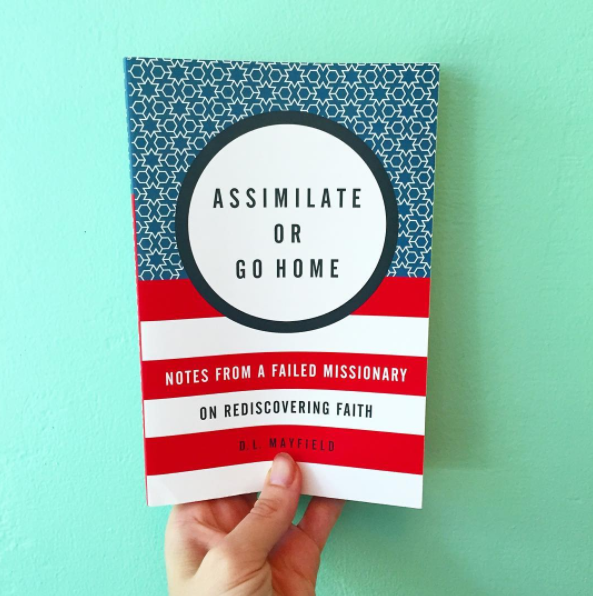 We're big fans of D.L. Mayfield's unique and relentless voice in the world of Christian writers, and are eager to celebrate the one year anniversary of the release of her book, Assimilate or Go Home: Notes from a Failed Missionary on Rediscovering Faith. She has graciously offered to give away THREE COPIES to you lovely readers, and you can look for the deets on that coming up on our Instagram feed! In the meantime, we know you'll gobble up this little interview we did with D.L. Each of the co-hosts asked one question, and she knocked 'em outta the park. It's the Upside Down kingdom indeed. Kristi: You consistently tackle pretty tough and controversial topics in your writing. What is it like to do that as a female Christian writer/author? Do you feel that you’re taken as seriously as your male counterparts? Are you more likely to be ignored or challenged? Any advice for other female Christian writers? I love this question and have never been asked it before! One interesting thing is that I write under my initials so sometimes conservative men assume I am a dude :) I think that early on I avoided the mostly “inspirational” women writing platforms and became more of a freelance writer with a very specific beat (refugees and/or inequality in America). I do think in general I have been taken seriously, but recently my husband told me he thinks I really undervalue myself by constantly referring to how emotional I am. He said that actually I am quite rational in my arguments, but that I have absorbed a narrative where since I am a woman I just write about my feelings and experiences. As he pointed out, however, I usually have a very concrete plan for trying to convert people to my point of view. I think it’s great to write for female audiences but it’s also great to branch out--this is true in every direction. I have really enjoyed not being pigeon-holed (I write for a veeeeery wide spectrum of places--from our local Alternative weekly to Christianity Today). Being all over the place is fun, but probably not very good for branding or platform or book sales. For female Christian writers I would say read and pitch widely, and we will all be better for it. Lori: You and your husband Krispin lead lives that demand a lot of you- emotionally, mentally, and physically. How do you do “soul care”? How do you care for yourselves and your health while living among the demographic that you love? Oh I wish I had a good answer. I am pretty good at the little bits of soul-care: taking baths, reading good books, eating both healthy and unhealthy foods (they can both help me!). I exercise, and am trying to be more disciplined in reading Scripture in the morning writing in my journal (Lord, I hope no one ever reads it . . .) Honestly it is hard, because my kids are 2 and 6 and both very demanding and I am the primary care-giver. It can often feel like everyone I know just needs so much from me. But, my husband is a therapist and has a very different approach to life so he helps me slow down, listens to me when I despair, and reminds me I am not God. We also have a weekly gathering of people who live/work in similar communities and we do a one-hour liturgical prayer time where we bring our neighbors and our prayer requests to God and leave our burdens at God’s feet. It has been incredibly helpful for me. I need to know others are experiencing what I am, that others are being overwhelmed by the inequalities of the world--and then I need to lay it down. Lindsy: Pouring a decade of your life into solidarity with refugees has given you a lot of insight into the relationship the Church has with non-Christians, and specifically the marginalized. How do you hold the balance between calling the Church to something more and not losing hope? What does church look like for your family now? Is your local church a place where your refugee friends could feel welcomed and safe? Well this is the question, isn’t it? We found God in the places the church told us God was absent. Now what to do? I think I have really shifted my writing in the past few years to try and communicate with Christians on all they are missing out as they try and establish safe and secure and theologically orthodox institutions. I took my missionary zeal that was stoked in the church and have turned it back on them! I think in our current political climate my hope has been tested more than ever. The ugly seams of white supremacy are showing up all over the conservative evangelical community. It’s been rough. On one hand I am losing faith in the people who taught me to care about morality and fidelity and charity and who vote for the opposite--on the other hand I live surrounded by people whose lives are made miserable due to current policies (the travel ban, for instance, or the increasing fear and hate-filled rhetoric surrounding undocumented immigrants). So in order to process my grief, I have to make a commitment to keep trying to reach out and invite people into the way of Jesus and his kingdom. That’s all I got. I long for the day when something is rebirthed from the ashes of the evangelical church. I don’t think people even realize how much of our witness has been tarnished due to the last election. On a happier note, we attend an awesome church in Portland that believes in Jesus and the Bible and the holy spirit and in pursuing justice hardcore. Most of the staff are people of color, and it has been so good to be under their leadership in these trying times. I also read more Christians of color than ever and their lives and theologies breath life into my faith. Kayla: Do your neighbors know you wrote a book about being a Christian missionary? What do they think about it? Does your public writing ever make those community relationships feel awkward? The main people in my book do know, and they don’t really care. I sweated bullets, however, because it was clear to me when I asked for permission they didn’t understand the full nature of what it means to publish a book. Now, I can have conversations with the two main girls in my book, and they are so frank and awesome. I think the younger sister (I call her Khadija in the book) will someday write her own book, and it will be amazing. I carefully edited what I wrote about since most of the people I know do not want to be visible or draw attention to themselves. I try and be very careful, and in my present day writing I don’t use names or identifying characteristics. Most of my friends currently are recently arrived refugees and I tell them I write sometimes but they just know me as a mom and neighbor and ESOL teacher. In my dreams I think about what it will be like if people get safe and stable housing and good jobs--I would love to collaborate on a writing project. In general, it hasn’t been too awkward, especially since I try and stay in my lane and only write about what I observe, and I don’t try and be an expert on the refugee process or what life is like here. Maybe after a lot of time has passed I will be able to share more specific and concrete stories (which I think are powerful, but they are fraught with ethical concerns). The more people get adept at English it will be interesting to see what they think of my writing! I no longer feel ashamed of it however--part of being alive in our world is knowing anyone and everyone can read your work, so you best have tried hard to be as ethical as you can. Which means most of all the very best stories will never be shared, and I am OK with that. Shannon: I love that a major theme of your book is discovering the love of Christ for you personally, not His love for your ability to achieve, save souls, or produce results. One of my favorite lines is when you say, “this is the story of how I failed miserably, and what a good thing that turned out to be”. What is it about brokenness or “failure” that has wrought so much change in your spiritual life? Failure is essential if you grew up like me entrenched in white supremacy and a colonial idea of missions/ministry. It taught me that I am not inherently right or superior or good at anything. It taught me to allow my neighbors and friends to be my teachers, to disciple me in the ways of Jesus, actually. Failure brings you to such a place of need from God, when I thought God needed me to save the world. I still need to remind me of this, and my life (which is still so full of “failures” if I choose to view them like that) is very helpful in this regard. Jesus can’t heal me if I think I am well, that I have it all figured out, that I can muscle my way into righting all the wrongs of the world. Jesus can only heal me if I admit I am sick, which I am learning to do so slowly. Many, many thanks to D.L. Mayfield for this thoughtful interview, and don't forget to check in on Instagram for a chance to win one of three copies of her book! (And psssst in case you don't win: it's on sale over at Amazon for the whole month of July- the Kindle edition is only 2 bucks!)
14 Comments
Hi Friends! You might've noticed, a new episode dropped last week! Those of you who took our listener survey earlier this year said you weren't really into checking the blog for show notes... BUT several of you have reached out asking for show notes for this episode so we are at your service.
Lori, Shannon and I worked from Dean Brackley's definition of downward mobility: "The solution to our global crisis is not that the poor become rich, which is neither feasible nor desirable, but that the rich join with the poor. The only solution is communities of equals, resisting pyramids of inequality. While some economic differences are legitimate, discrimination and misery are not. In communities of equals, personal talents, instead of advancing some at others' expense, are stewarded for the benefit of all." HashtagthoseJesuits. Often, we think of living a life of poverty when using the term "downward mobility", but Henri Nouwen in The Selfless Way of Christ points out three great temptations of upward mobility, not one of them being exaclty and only physical wealth: "Three temptations by which we are confronted again and again are the temptation to be relevant, the temptation to be spectacular, and the temptation to be powerful." Do you feel the pull of those temptations? Had you heard the term downward mobility before? Are you consciously making choices for the benefit of common good and our fellow humans? What does this look like in your actual life? Join us in our Facebook group to continue the conversation or here in the comments! BOOK talked about in this episode: Not All of Us Are Saints *Affiliate links are used in this post. 'Cause your girls could use a few good mics. |
SHOW NOTESCheck out links & details to what we've talked about in every episode! ARCHIVES
September 2017
CATEGORIES |
About |
Join Us |
© COPYRIGHT 2015. ALL RIGHTS RESERVED.
|


 RSS Feed
RSS Feed